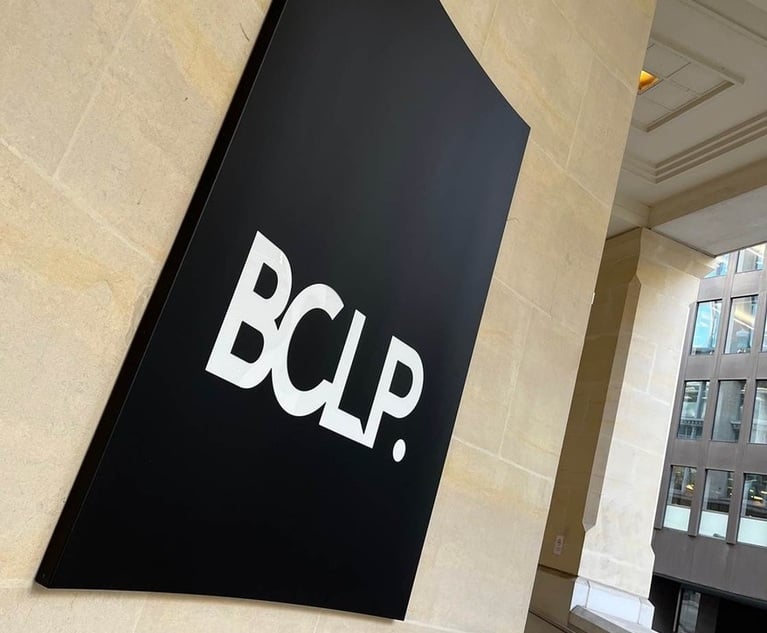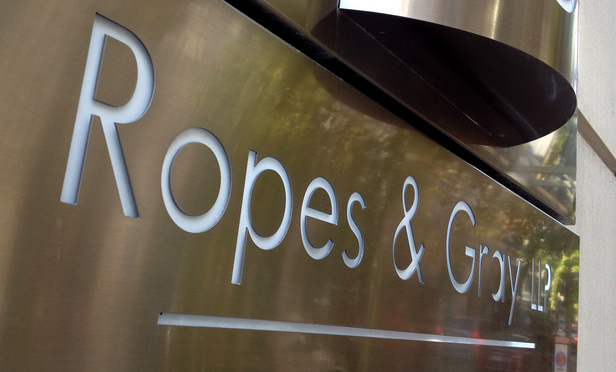'It's going to be death by a thousand cuts' – why are so many partners leaving Ropes & Gray?
Ropes has seen more than 20 partners exit the firm since the start of the year. Here, current and former partners give their take on the departures
September 12, 2017 at 07:48 AM
8 minute read
"It's going to be death by a thousand cuts if people keep leaving at this rate."
One former Ropes & Gray partner does not mince his words when reflecting on the rate of departures the Boston-headquartered firm has seen so far this year.
During the past two months, eight partners have left the firm across five offices worldwide, with a total of 22 heading for the exit door since January; 23 if you count London co-founder Maurice Allen, who stepped down from the partnership last year but only left at the end of February.
In addition to Allen, seven of the departures have been in London, with investment funds partner Monica Gogna this month joining those heading for the exit with a move to Dechert. Two of her fellow London partners are now at Kirkland, with another two at King & Spalding, as well as one apiece at White & Case and Linklaters. Allen is now a consultant at DLA Piper, and Ropes' London office now consists of 27 partners.
As with most partner exits, the departing partners fall into two camps – those the firm is not that sorry to see go, and those it would much rather have kept.
While partners inside Ropes suggest that none of those leaving were actively asked to leave, its infamous 'black box' partner remuneration system – which means that in theory no one knows what anyone else is being paid – makes it relatively easy for management to encourage people towards the door by docking pay in their annual review.
Partners who were disappointed with their remuneration this year "got the message they were meant to get", according to one current London partner.
He adds: "A couple of people were surprises to lose. For the most part though, they came to a decision based on the message from the firm. Some people aren't making enough money."
Some exits, however, are more likely to cause pain; such as the mass defections to US rival Kirkland, which has been the biggest beneficiary of the departures after picking up six partners in one month, including an enforcement team of five across offices in Hong Kong, London and the US in August.
It got to the point where I got frustrated about what the London plan was
The Chicago firm returned to Ropes the following month for City funds partner Anand Damodaran, who is described by one former Ropes partner as "a big loss".
A current Ropes partner concedes that Damodaran's exit is "difficult from a business perspective".
But what is driving exits such as these?
Former partners argue that regardless of office, there is an issue around communication and sometimes implementation of strategy at the firm.
One former London partner says: "The firm is managed pretty opaquely. It was hard to figure how decisions were being made and how you got heard. It got to the point where I got frustrated about what the London plan was; what the strategy was."
Another former London partner adds: "There was an issue around communication and this left some disillusioned with management. If you don't feel appreciated it doesn't help."
The only thing we are not transparent about is partner compensation
A third ex-Ropes partner adds: "The firm is famous because it's got a black box compensation system. I think a number of people found that opaque aspect extended further than compensation. It's hard to figure out how decisions were made and how you get heard."
Ropes' management, however, refutes claims that it is dictatorial. Managing partner David Chapin says: "We're designed to not be autocratic and dictatorial. If a partner at Ropes doesn't think they have the opportunity to discuss topics, then they're either not accepting the invite or not paying attention. We are constantly looking for ways to do things better and open up more lines of communication."
The firm's opaque compensation system, similarly blamed at US rival Jones Day for a spate of exits, also comes in for criticism for its polarising effect on partners.
Described by a former London partner as "the worst thing about the firm", the compensation system is something Chapin argues is up to individual partners to find peace with, or move on from.
"The only thing we are not transparent about is partner compensation," he says. "Some partners in some law firms, including Ropes, can't live in a world where they don't know what the person next door is making. If that's the determining factor, then Ropes isn't the right place for them."
Others point to a poorly implemented strategy in London as part of the problem. Says one former partner: "Verbalising a strategy is easy, but the implementation differed from the narrative. If you position yourself as a leading private equity firm, you don't achieve that aim in London by hiring some mid-market private equity people."
London head Mike Goetz argues that the City practice is far from mid-market. He stresses: "We've led some of our largest deals from London, so we're not just focused on mid-market practice. Larger private equity transactions take a little longer to move into, and the volume that was there seven or eight years ago isn't now. The mid-market has been active, so it's a valid strategy to get that flow of business – but we're not resigned to just having a mid-market focus in any of our businesses."
If I wasn't having my partners recruited I'd be worried about the kind of partners we had
He points to the addition of four new PE clients in the last few months as signs the firm is going in the right direction under the leadership of former Travers Smith private equity head Phil Sanderson.
The City office has added Exponent Private Equity, Pulsant, Oakley Capital and Intermediate Capital Group to its roster, and earlier this year London PE partner Will Rosen led the firm's team advising shareholders on the $1.8bn (£1.4bn) sale of Weetabix Limited to US cereal firm Post Holdings.
While those outside the firm suggest there are likely to be more exits in the coming months, Chapin claims not to be concerned about any longer-term impact on the firm.
He says: "We have lost some people we'd rather not have lost – but that's the nature of business. We have really good partners that other firms want – if I wasn't having my partners recruited I'd be worried about the kind of partners we had. We don't get too hung up on short-term fluctuations."
Those planning to remain with the firm will be hoping he's right.
Ropes & Gray partner departures in 2017
September London investment funds partner Monica Gogna – Dechert Washington DC corporate partner Paul Rubin - Debevoise & Plimpton
August Chicago managing partner and global anti-corruption and international risks co-chair Asheesh Goel – Kirkland & Ellis New York securities and futures enforcement co-head Zachary Brez – Kirkland & Ellis Chicago government enforcement partner Kim Nemirow – Kirkland & Ellis London government enforcement partner Marcus Thompson – Kirkland & Ellis Hong Kong government enforcement partner Cori Lable – Kirkland & Ellis London investment funds partner Anand Damodaran – Kirkland & Ellis
June London finance partner Mark Wesseldine – King & Spalding London finance partner Fergus Wheeler – King & Spalding Boston private equity partner Jason Serlenga – Kirkland & Ellis Boston real estate investments and transactions co-head Marc Lazar – Goodwin Procter
May London restructuring partner James Douglas – Linklaters
April Hong Kong managing partner Paul Boltz – Gibson Dunn & Crutcher Hong Kong corporate partner Brian Schwarzwalder – Gibson Dunn & Crutcher Hong Kong corporate partner Michael Nicklin – Gibson Dunn & Crutcher Hong Kong private equity partner Scott Jalowayski – Gibson Dunn & Crutcher London structured finance partner Chris McGarry – White & Case Hong Kong litigation partner Patrick Sinclair – Davis Polk & Wardwell
March Former London senior partner Maurice Allen – DLA Piper
January Asia private investment funds head Geoffrey Chan – Skadden Arps Slate Meagher & Flom Washington DC intellectual property partner Nicole Jantzi – McDermott Will & Emery Washington DC intellectual property partner Paul Schoenhard - McDermott Will & Emery
This content has been archived. It is available through our partners, LexisNexis® and Bloomberg Law.
To view this content, please continue to their sites.
Not a Lexis Subscriber?
Subscribe Now
Not a Bloomberg Law Subscriber?
Subscribe Now
NOT FOR REPRINT
© 2025 ALM Global, LLC, All Rights Reserved. Request academic re-use from www.copyright.com. All other uses, submit a request to [email protected]. For more information visit Asset & Logo Licensing.
You Might Like
View All
Jones Day Names New Practice Leaders in Brussels, Latin America and the US

Lawyers React To India’s 2025 Budget, Welcome Investment And Tax Reform

BCLP Joins Crowded Saudi Legal Market with Plans to Open Two Offices
3 minute readTrending Stories
- 1ACC CLO Survey Waves Warning Flags for Boards
- 2States Accuse Trump of Thwarting Court's Funding Restoration Order
- 3Microsoft Becomes Latest Tech Company to Face Claims of Stealing Marketing Commissions From Influencers
- 4Coral Gables Attorney Busted for Stalking Lawyer
- 5Trump's DOJ Delays Releasing Jan. 6 FBI Agents List Under Consent Order
Who Got The Work
J. Brugh Lower of Gibbons has entered an appearance for industrial equipment supplier Devco Corporation in a pending trademark infringement lawsuit. The suit, accusing the defendant of selling knock-off Graco products, was filed Dec. 18 in New Jersey District Court by Rivkin Radler on behalf of Graco Inc. and Graco Minnesota. The case, assigned to U.S. District Judge Zahid N. Quraishi, is 3:24-cv-11294, Graco Inc. et al v. Devco Corporation.
Who Got The Work
Rebecca Maller-Stein and Kent A. Yalowitz of Arnold & Porter Kaye Scholer have entered their appearances for Hanaco Venture Capital and its executives, Lior Prosor and David Frankel, in a pending securities lawsuit. The action, filed on Dec. 24 in New York Southern District Court by Zell, Aron & Co. on behalf of Goldeneye Advisors, accuses the defendants of negligently and fraudulently managing the plaintiff's $1 million investment. The case, assigned to U.S. District Judge Vernon S. Broderick, is 1:24-cv-09918, Goldeneye Advisors, LLC v. Hanaco Venture Capital, Ltd. et al.
Who Got The Work
Attorneys from A&O Shearman has stepped in as defense counsel for Toronto-Dominion Bank and other defendants in a pending securities class action. The suit, filed Dec. 11 in New York Southern District Court by Bleichmar Fonti & Auld, accuses the defendants of concealing the bank's 'pervasive' deficiencies in regards to its compliance with the Bank Secrecy Act and the quality of its anti-money laundering controls. The case, assigned to U.S. District Judge Arun Subramanian, is 1:24-cv-09445, Gonzalez v. The Toronto-Dominion Bank et al.
Who Got The Work
Crown Castle International, a Pennsylvania company providing shared communications infrastructure, has turned to Luke D. Wolf of Gordon Rees Scully Mansukhani to fend off a pending breach-of-contract lawsuit. The court action, filed Nov. 25 in Michigan Eastern District Court by Hooper Hathaway PC on behalf of The Town Residences LLC, accuses Crown Castle of failing to transfer approximately $30,000 in utility payments from T-Mobile in breach of a roof-top lease and assignment agreement. The case, assigned to U.S. District Judge Susan K. Declercq, is 2:24-cv-13131, The Town Residences LLC v. T-Mobile US, Inc. et al.
Who Got The Work
Wilfred P. Coronato and Daniel M. Schwartz of McCarter & English have stepped in as defense counsel to Electrolux Home Products Inc. in a pending product liability lawsuit. The court action, filed Nov. 26 in New York Eastern District Court by Poulos Lopiccolo PC and Nagel Rice LLP on behalf of David Stern, alleges that the defendant's refrigerators’ drawers and shelving repeatedly break and fall apart within months after purchase. The case, assigned to U.S. District Judge Joan M. Azrack, is 2:24-cv-08204, Stern v. Electrolux Home Products, Inc.
Featured Firms
Law Offices of Gary Martin Hays & Associates, P.C.
(470) 294-1674
Law Offices of Mark E. Salomone
(857) 444-6468
Smith & Hassler
(713) 739-1250










